The formal tender document reveals only two support vessels are guaranteed to be built, with the third now only being an “option”.
GMB national officer Ross Murdoch said:
“This is a hugely disappointing decision by the Government who have once again let down the UK’s shipbuilding communities. Not content with insisting these Royal Navy support ships are built overseas, now the pressure is on to build them in the UK, they want to only build two.
What has this Government got against the UK shipbuilding industry? GMB demands the Government commit to three ships – and make sure they are built in UK yards.”
According to the official tender for the project:
“The Commercially Supported Shipping Team is seeking to procure up to 3 in number Fleet Solid Support Ships for the Royal Fleet Auxiliary (RFA), with a firm requirement for 2 ships and an Option for a further 1 ship. The RFA is tasked with the delivery of logistic support to the UK Royal Navy whilst at sea (Afloat Support). Its ships are currently merchant registered and British Flagged, regulated by the Maritime Coastguard Agency and classified by Lloyds Register. As a single organisation, the RFA delivers the totality of Afloat Support services. It provides both agility and value for money in manning its ships, and ensuring that the vessels are available and capable of supporting any military operation whenever and wherever tasked.
The role of RFA Solid Support ships is to replenish surface warships and other auxiliaries with ammunition (ordnance, munitions and explosives), food and solid stores. Solid Support ships must be capable of safely embarking, storing, preparing for and conducting underway Replenishment at Sea (RAS). There are three methods of delivering this, the abeam method (most common) and the transfer of general stores by aviation, referred to as Vertical Replenishment or Vertrep. The third method used is by Ships Crane for boat transfer ashore/to another vessel or to jetty whilst alongside in port.
The Royal Navy delivers an Expeditionary warfare capability, which requires it to operate World-wide. This Global reach reads across to the Solid support ship, which has to deploy and remain on station in a variety of environmental extremes. It must also integrate tactically with and contribute to a Naval task group. Its cargo is the life blood for the warships but, as a platform, it is also essential that it does not detract from the operational aims of the group.
The primary role is to support war-fighting operations.
The Solid Support ship has to operate and survive against a capable and hostile enemy threat and continue to deliver its prime logistic service to ensure overall mission success.
The introduction of the Queen Elizabeth Class aircraft carrier and its aircraft, the F-35B Lightning II, represent a significant increase in our Carrier Strike capability.
That needs a corresponding increase in the tempo and volume of solid support, something that cannot be met by our current ships. While Carrier Strike will move into new realms of Air Combat, Amphibious operations will remain equally demanding, particularly the need operate in the littoral with the different threats and environmental conditions that this will pose. The FSS ships will need to support all tasks for the future Royal Navy, from full Carrier strike war-fighting through to Peacetime operations.”
GMB research shows that up to 6,700 jobs could be created or secured in the UK if the order went to a domestic shipbuilder – including 1,800 much needed shipyard jobs. A further 4,700 jobs could be secured in the wider supply chain – including in the steel industry.
The union estimates that £285 million would also be returned to the taxpayer through income tax, national insurance contributions and lower welfare payments.
Exclusive Survation polling, commissioned by GMB, found that 74 per cent of people want the new Royal Fleet Auxiliary (RFA) ships built in the UK. GMB maintains that RFA ships are military vessels that are crucial to the UK’s defence capabilities.
The Government’s current policy is to build all Royal Navy warships in the UK but orders for RFA ships are put out to international tender. Shipbuilding companies from Germany, Italy, the Netherlands, Poland, South Korea and Spain attended a recent Ministry of Defence industry day on the Fleet Solid Support order according to documents obtained by GMB under the Freedom of Information Act.
Ross Murdoch, GMB National Officer for Shipbuilding, said:
“The Government looks set to repeat the blue passports fiasco by putting another order of national significance out to tender abroad. Ministers are not bound by normal EU rules on competitive tendering when it comes to military ships. There really can be no excuse for sending our shipbuilding contracts overseas.
We have a highly skilled shipbuilding workforce in the UK that is more than capable of making these ships at a fair market price. We face being sold down the river if the work goes to artificially subsidised international competitor shipyards instead. At a time when global tensions are rising, the Government should use this order to ‘buy for Britain’ and rebuild our defence shipbuilding manufacturing capabilities.
Shipbuilding workers are disillusioned by orders flowing overseas while highly skilled jobs at UK shipyards are being cut. It would be a gross betrayal of the spirit of the ‘red, white and blue Brexit’ that Theresa May promised if this crucial contract is awarded outside of the UK and jobs here are lost as a result.”
Reacting to this news earlier in the week, the First Minister of Scotland stated that the international tendering for auxiliary vessel contracts is a betrayal for the Clyde, despite the yards having no interest in them, having never been promised them and the fact the vessels couldn’t physically fit on the slipway.
Speaking during First Minister’s Questions, she said:
“That work should be on the Clyde, I argue that that work was promised to the Clyde and should definitely go to the Clyde. We should be very clear. What we are now seeing develop around that work and the future of the shipyards is nothing short of a blatant betrayal of Scottish shipyards. During the referendum, promises were made to those shipyards by the Tories, and indeed, by all the unionist parties—the shipyards were told of promises of work for years to come. The unionist parties specifically said that, if Scotland became independent, it would not be able to secure that work for the Clyde, because contracts could not go to “foreign countries. It is an absolute betrayal and I hope that we will hear all parties across the parliament stand up for shipbuilding on the Clyde.”
Sturgeon said the move was an “absolute betrayal” in light of promises made in the run-up to 2014’s independence vote. In fact, what was “promised” before the referendum was work on complex warships, like frigates and destroyers. There are three key problems with this:
-
- The Clyde is at capacity with the River class and Type 26 Frigate builds and has no intention of bidding for this work.
- The 40,000 tonne support vessels wouldn’t physically fit on the slip alongside the Type 26 Frigate builds.
- The only vessels “promised” were warships, such as frigates and destroyers.
The unions are advocating that the build stay in the UK, not that it be done on the Clyde and this is something we agree with. There are strong arguments to build these ships in the UK.
Jude Brimble, GMB National Secretary, said:
“The Royal Fleet Auxiliary contracts are the key to unlocking the country’s massive shipbuilding potential. But Ministers refusal to put the UK’s interests first will mean that instead of a massive programme of shared economic and employment re-distribution, our firms will be competing against each other for slivers of complex warship work. It beggars belief that the Government wants to give this golden opportunity away to foreign competitors when working class communities up and down the country are crying out for decent work.”


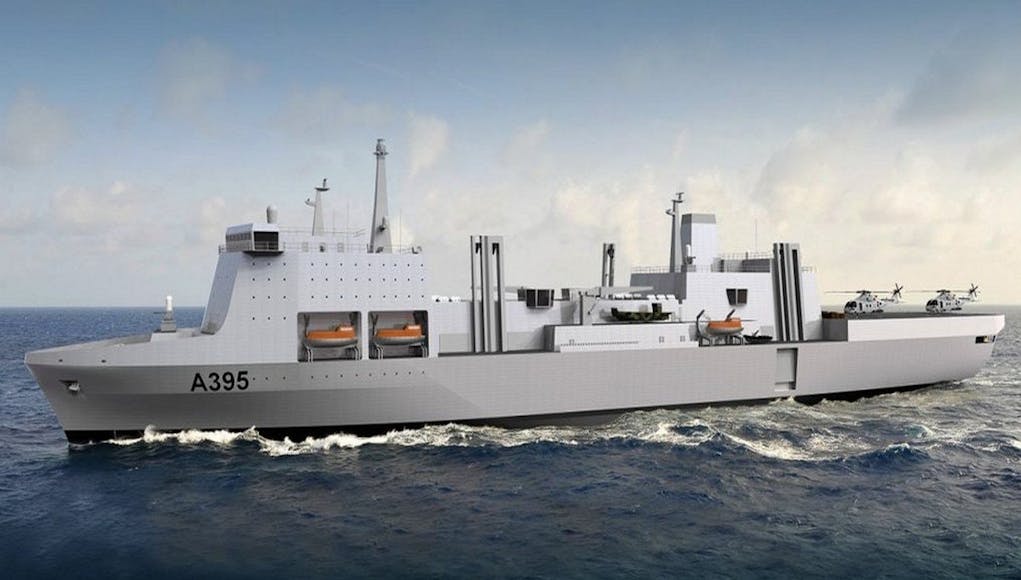
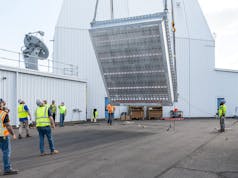
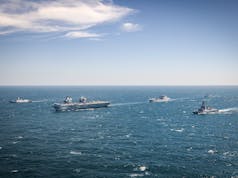






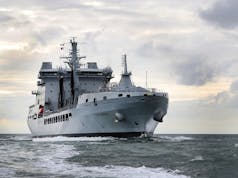
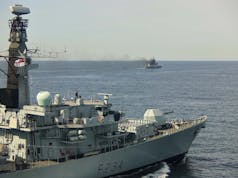

Another old Mod trick.
Announce minor cuts here and there like a drip feed then when / if MDP results in bigger cuts it looks less as they have already announced plenty of others in the months before it which the vast majority of Joe Public are unaware.
(Chris H) Asking for bids on 3 ships with the indication the third is an option (presumably dependent on how good the first two are) is eminently sensible. It is not a ‘cut’ it is a structured and sequenced ITT for a maximum of 3 ships.
The MoD can order two and if money is tight they do not order a third. It would not be a cancellation and therefore no extra costs. Call it a ‘batch’ of 2 and it is just like all other major procurement. Given the timescale I am not sure this Government can actually bind a future Government.
Everyone talks of 5 Type 31e ships but how many will be ordered to start with? My money is on 3 just like the Type 26
Danielle it’s MoD not Mod. I’m a Mod and I have never tricked ! Sorry I have to go and get some counselling for the trauma I feel right now !
Hopefully the two definitively ordered will replace the Fort Rosalie class and the optional one will be taken up once Fort Victoria goes out of service after them. Am I correct in thinking that Fort Victoria has a later out of service date due to currently undergoing major refit as well as being part oiler?
Yes.
Maybe, just maybe the reduction to two reflects a higher spec ship than we think, therefore costing more? No notification of a change in the budget for these ships I hav seen.
Seeing as we have not seen the design yet we may yet be pleasantly surprised.
Or not.
[…] post Fleet Solid Support ship order reduced, now two ships with option for third appeared first on UK Defence […]
Disappointing but understandable method of achieving goal. I would suggest the MOD never officially announce the quantity but only the intent to purchase. On so many occasions initial fleet numbers are presented only for those to be pared down as the budgets move upwards. I can’t think of one programme where it came in with the precise planned fleet establishment? Watching the TV documentaries on the QE carrier recently, and the sea trial issues that were encountered, the costs don’t stop on commissioning.
I think 2 will be built initially. UK yards will need to put in a market value bid and then build the ships on time and on budget. If they can do that then it is likely the 3rd will be built.
RFA Fort Victoria is receiving a refit and is not scheduled to leave service until 2025 I think.
Plenty of life left in her yet.
I think the ball is well and truely in the UK shipyards courts now to deliver.
Smart move.
The RFA capability is getting really good, makes sense to cut here and put those resources, particularily manpower, into the frigates. If we find ourselves needing support ships beyond these 2 then we have allies eveywhere.
Stupid to build these in the UK, the yards will all be working on SUSTAINABLE frigate building with the capacity to ramp up quickly as will no doubt be required as our soft power, including the foreign aid budget, gets us export orders for both frigate types.
Would be nice to revive shipbuilding in Belfast. Harland and Wolf were an iconic British brand and in their day capable of producing some of the worlds finest. It may be that they have lost too much by way of skills and capacity but even if they got some of the work it would be nice to see other parts of the UK get a share of the pie. On an historical note, my Grandfather born in 1882 saw Irish soldiers return from the Anglo-Boer War and was at the launch of the ill fated Titanic. I got those stories from him first hand as a wee lad!! Talk about being able to touch history!
The RFA are manned by civvies ( Stand fast the 5 RN matelots looking after Phalanx). No manpower savings to be had for manning up any Frigates.
Yes you are right, thanks.
No it’s not “stupid” to build our own ships. No, “all” British yards will not be working on the frigates. Other European countries manage to build these sort of ships and also build ships for export, if they can manage it, so can we.
These should definitely be built in Britain. With the facilities and experience gained from building these large ships we will be able to start bidding for cruise ships like other European countries do.
Unite the union have released a report yesterday stating that most of foreign competitors are either owned or heavily subsidised by their governments & none of these governments have ships like this built outside their own country.Only our fools..
unless uk yards can build them to the same cost as a foreign yard then why not tender it out its by far the best value, if these ships were built in the uk I bet a new type 31 would be sacrificed to cover the cost, we need to stop thinking nostalgic and get the best value for money unless the defence budget is about to leap through the roof
Building them in UK is beneficial to the balance of payments. Means more jobs in UK and less dole payments too. To satisfy the EU, the tender could include comms and weapons fits.
(Chris H) Dean – Sorry but you are like the MoD who fails to understand the difference between ‘Price’ and ‘Nett Cost’ when spending UK taxpayer money. I could argue about unfair subsidised competition from foreign owned shipyards some of whose owners seem to have a current policy of damaging the UK at every chance. Like France. But its much simpler than that:
* Do we want to use UK taxpayer money to benefit say South Korean jobs and their economy or British jobs and economy?
* Do we want 100% of whatever cost exported or 100% retained within the UK economy?
* Do we want to add further huge amounts of imports and add to our woeful balance of payments?
* Do we want the UK Treasury to retrieve some of the ‘cost’ or give it to a foreign Treasury?
* Do we want UK taxpayer money invested in foreign (and therefore our competitor) manufacturing and industry supported or in UK manufacturing and industry?
As private individuals we are free to buy whatever we choose from wherever we choose. I am happy with that (but still choose to buy British or Commonwealth) but there is IMHO a fundamental difference when it is taxpayer money taken from us by force of law and then given to foreign people in decisions about which we have no control. Its bad enough with Foreign Aid that gives UK industry little or no benefit unlike the US model where its Foreign Aid directly benefits its industry. Major contracts like this should be placed here even if the ‘Price’ is higher.
good points chris, im not sure if there is a simple math formula that says they cost x from a uk shipyard and we get back y in taxes x-y equals less than the cost of the ship from korea, if the answer is no then in a capitalist country its a simple no brainer. which ever is cheaper then build it cheaper. but im ot sure there is a simple equation to that question
AS is usual the Unions willingly shove their heads into the sand exposing their buttocks from which a load of hot air expels Facts are ignored , reality jettisoned , only the Party line quoted .
Ah well only the headless will swallow the Mantra.
I have no love for Len Maclusky but the unions are right on this one. By fighting some sort of moral crusade for Adam Smith economics all we achieve is screwing our sovereign industrial capabilties into the ground and subsidising foreign tax payers.
(Chris H) Peter french – I doubt many people deslike Trade Unions as much as I do but on this campaign they are bang on the money. Its worth actually reading the document they and their industry partners (now doesn’t that make a great change) have produced:
http://www.unitetheunion.org/uploaded/documents/FleetSupportShips-2018-05-1411-34321.pdf
Good spot. A well presented and well argued case.
The unions are spot on.
No the unions are right on this one. We need to build in the UK. If there is no capacity then we need to build it in the UK. Fine to allow international bidders, but stipulate build in the UK and support that build out of capacity with grants, loans and guarantees, which we already do to a certain degree from the department for business. We need to think long term else the next time again will be he same case – “uk not competitive, no capacity” you need to invest smart to make the uk competitive and have capacity.
Exactly.
We definitely want these ships built in the U.K., and 3 of them (2 is not enough). Use it as an opportunity to invest in a British shipyard to make them as competitive and efficient as possible. Ideally a single site build as far as possible (it will never be cost effective or competitive to build blocks hundreds of miles part with the associated transport costs, no successful shipbuilding country does it this way so that cannot be our long term plan). With the facilities and experience gained from building these large ships we will be able to start bidding for cruise ships like other European countries do, and actually make money in the long run.
In the long run we should invest in British shipbuilding in the following way. Build the “frigate factory” on the Clyde for the medium sized stuff (frigates, destroyers, O.P.V.s etc.) and build a large enclosed dockhall on the Tyne or Mersey (Scotland can’t have everything and I’m sure they would be more than happy with the frigate factory) for the large stuff (aircraft carriers, solid support ships, R.F.A. tankers, amphibious, etc.). This facility could also be used to bid for cruise ships.
Also make it a rule that all Navy AND R.F.A. are built in Britain and in this way we will be able to have a decent sized sustainable shipbuilding industry in Britain.
In the short term it may be best to build the type 31s at Cammel Laird, and the solid support ships at Rosyth (or Harland & Wolff) with blocks built from around the country, but the long term plan for British shipbuilding should be what I have stated. This will, in the long term, make British shipbuilding as cost effective, efficient and competitive as humanly possible.
The refit work being done on Fort Victoria is significant so maybe the calculation is we might be able to make do with just 2 FSS.
https://www.savetheroyalnavy.org/rfa-fort-victoria-modified-to-support-the-aircraft-carriers/
Some interesting comments here. I particularly like T.S’s optimistic take on one possible outcome (“Maybe, just maybe the reduction to two reflects a higher spec ship than we think, therefore costing more? No notification of a change in the budget for these ships I have seen.”). It’s possible, and I like the thinking, but I’m not holding my breath. The answer is probably out there right now for those with access to the tender documents. If they say that the whole price including the option for a 3rd vessel if taken up must be within the £1bn budget (with possibly some time/inflation protection on the price of the optional vessel if the delay in exercising it is long) then we’re not getting more than we thought. If however it is now an initial contract value for 2 ships (which might be reduced from £1bn) with the cost for the third vessel specified separately then just maybe we might get some increases in spec depending on how much of the £1bn budget is retained for the first 2 ships.
Just looking at previous tonnage rumours of 40,000t for the new FSS and assuming the first 2 will replace the Rosalies that’s each 23,000-ish ton Rosalie class being replaced by a 40,000 ton ship. I see in Wikipedia that the Rosalies have a single landing spot at the back and an emergency spot on top of the hangar. Interestingly the scant details of the new FSS mention a flight deck at the back (1 or 2 spots I wonder) and a spot on top of the hangar so quite similar (or significantly better if a 2-spot deck at the back). The Rosalies are also listed as capable of carrying 4 Sea King so hopefully the new FSS will be at least 4 Merlin. Presumably we do need an uplift in tonnage though with the carriers and also T26 being much bigger ships than T23.
If Fort Victoria does get run on for a while and then replaced by taking up the option for the third vessel then this latest tweak to the plan doesn’t seem like a catastrophe to me. One of the comments on the Savetheroyalnavy article mentioned that this refit is for 8 years so perhaps this could all come together OK but they need to get on with those first two FSS ASAP.
I think it is simply a calculation that if you synch up the FSS build timetable, the planned F-35B buy rate, the in service dates for QE and POW, an assumption that only one carrier will be ar sea at any one time and factor in the Fort Victoria refit the answer you get is that 2 probably is sufficient.
I agree. Those calculations don’t happen this quickly though so it all makes me wonder whether we are seeing this particular news thread through something of a kaleidoscope. Maybe the initial announcement was never for 3 ships all at once, maybe it was always 2 + option for a third but some journalist (and not blaming UKDJ here, I’m sure the source was elsewhere) misunderstood and misreported someone’s quote, or skimmed too quickly and misinterpreted a document, which gave rise to the original “£1bn contract for 3 FSSs” headlines when in fact it was always £1bn for 2 FSS plus option for a third.
This is a guess, but maybe 3 was indeed the genuine intention until someone ( maybe some bright spark at CL) pointed out that the original Fort Victoria refit specification could be enhanced such that the ship could resupply the carriers; not as well as the new FSS design but well enough in extremis. What with the constant pressure to find savings you could then justify pushing 1/3 of the FSS to the right. Ten years is another 2 defence reviews, at least.
(Chris H) Sorry Defence Journal but you just kicked off my OCD. Given no supplier has bee selected let alone orders placed how can it have been ‘reduced’?
(Chris H) I know some folks on here rubbish YouTube but I think this is bloody terrific and shows what we can do even in a limited space. Its the Sir Richard Attenborough research ship hull being built in Birkenhead … Enjoy!
https://www.youtube.com/watch?v=fjRkywzKDYs&feature=youtu.be
The RFA are struggling to crew what they have so a cut to two was always on the cards imho.
With the reduced size of the Royal Navy in general I am not entirely hung up on the idea of two dry stores ships as long as they are highly flexible in their design.
The main concern of the RFA will be that these vessels can be as lean manned as possible!
If a third is picked up I could see that being aligned with the retirement of RFA Argus, the original role of a dedicated Helicopter training ship is simply unnecessary now with the use of modern training aids and simulators. As for the PCRS role whilst nice to have I would prefer the development and procurement of a containerised solution that can be put on any vessel that has a suitable vehicle deck meaning a number of different RFA vessels could step into the role or those taken up from trade.
So a kind of hybrid Argus-Ocean general purpose flat top?
Derived from the Dry stores ship design (same hull and machinery etc) yes.
As I said on the other thread it seems to me this is to deliberately disadvantage UK shipbuilders, where a lot of the cost is per “class”, and the unit price lower with quantity. With the likes of South Korea it’s an off the shelf item with a different shade of grey and superstructure.
So basically if UK shipbuilders tender at £1 billion for 2, but South Korea at £750 million for 2, UK Gov can shrug and say “big difference, 33% more”. But for a UK bid for 3 at say £1.3 billion for 3, and South Korea at £1.125 billion for 3, less than 16% difference, UK Gov would be under pressure to give the work to UK shipyards.
That’s what I think it’s about.
I’m hoping the USN puts their two mothballed Supply Class AOR Fast Combat Support ships back into commission. They were taken out of service over the vociferous protests of the combatant commanders since they are built to warship specs and are the only logistics hulls that can keep up with the CSGs. More short sighted thinking on the part of the USN IMO when we are already short of these hulls…
https://en.wikipedia.org/wiki/Supply_class_fast_combat_support_ship
Cheers!
Sorry – meant AOEs
Well, either staff requirements are for 2 or 3. But if this only to be 2 with a third option why did we continuously hear about 3? Yes, it may be a sound practice, but it creates yet more uncertainty and is this a ploy to unnerve UK shipbuilders? Two ships could well be the more expensive option in terms of ship’s life and maintenance required if they are having to do more work. It could be taken to many that this is the first excuse to come out of the book of BS from the MOD. The next statement I have heard has already been written for the end of 2019 start of 2020. Bebb or Williamson will squeak out: “on price, it was decided that to have three ships we had to go with a foreign bidder, even though in reality the cheaper option is from the UK, but we don’t do tax stuff even though we have nearly 60,00 civilian staff in the MOD and as you know buying steel direct from a UK firm is too complex for the MOD too. Fighting for Britain fighting for value for the UK taxpayer (even though giving these ships or any ship contract abroad is not) yaaay and Russia go away, yaaay (again)”.
I think the MoD need to look at the state of the tideboats when making their decision to go abroad.
I am all for increasing the UK’s shipbuilding capacity and why not use Belfast? Naval auxiliaries should be reclassified as warships for the purposes of procurement, giving the Government flexibility as to where they are built – not tied to EU rules and the like. The net cost (net of income tax, employees and employers NI and Corporation Tax) of the UK build should be compared to overseas yards – this would reveal the true cost to the UK of building our ships overseas.
There is a huge amount of government subsidy in many overseas yards, which is unfair competition – none of which is acceptable to the British Taxpayer.